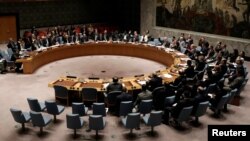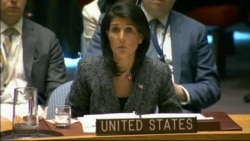Russia and China exercised a double veto Tuesday to block action in the United Nations Security Council aimed at sanctioning the Syrian regime for using chemical weapons against its own population.
It was the seventh time in the nearly six years of the Syrian crisis that Russia has deployed its veto to protect the regime of President Bashar al-Assad.
Council member Bolivia also voted against the measure, and Egypt, Ethiopia and Kazakhstan abstained. But there were the nine requisite votes in favor, enough to have adopted the measure had there not been vetoes by the two permanent council members — Moscow and Beijing.
The draft resolution that was defeated sought to impose sanctions on the Assad regime for the use of chemical weapons in at least three attacks on its own population in 2014 and 2015.
“Russia and China made an outrageous and indefensible choice today -- they refused to hold Bashar al-Assad’s regime accountable for the use of chemical weapons,” said U.S. Ambassador Nikki Haley, one of the drafters of the text.
WATCH: US Ambassador to UN Haley on chemical attacks
In 2013, the Security Council unanimously banned Syria from possessing and using chemical weapons, and it led the effort to dismantle and destroy the Assad regime’s stockpile. Chemical weapons continued to be used, however, including chlorine.
In 2015, the council worked with the Organization for the Prohibition of Chemical Weapons (OPCW) to set up a Joint Investigative Mechanism (JIM) to go to Syria and investigate allegations of chemical attacks.
In October, the investigators reported that the Syrian military had carried out at least three chemical attacks in 2014 and 2015 and so-called Islamic State terrorists had carried out at least one attack.
"There is nothing wrong with the investigation, Russia just doesn’t want to criticize the Assad regime for using chemical weapons,” Haley told council members. “So what message are we sending to the world? If you are allies with China and Russia they will cover the backs of their friends who use chemical weapons to kill their own people.”
Russian reaction
Russia’s deputy ambassador Vladimir Safronkov disputed the strength of the evidence that the joint investigation based its conclusions on, telling council members that the experts had “no convincing evidence on the basis of which any sort of allegations could be made.”
Safronkov said Russia had no other choice but to veto the “politically biased” text.
“If you read this voluminous document, it becomes absolutely clear that the point is levying sanctions against Damascus under imagined pretexts,” he added.
Most council members reiterated their opposition to the use of chemical weapons anywhere, but those voting against or abstaining on Tuesday said they based their objections on technical issues, such as the designation of 21 Syrian individuals and entities for sanctions.
Usually, a resolution would create a sanctions committee that would then designate names for such a list. Others said the measures could jeopardize a tenuous cease-fire and derail political talks between the parties currently happening in Geneva.
Britain, France and the United States worked for months on the draft resolution.
British Ambassador Matthew Rycroft expressed his disappointment and outrage over its failure.
“This is Russia’s seventh veto on Syria in five years, and it demonstrates yet again that Russia has prioritized protecting the Assad regime over protecting the Syrian people,” Rycroft told reporters after the vote. “Russia would rather cover up for Assad than prevent further use and proliferation of chemical weapons.”
"This is a sad day for Syrians and it is a dangerous day for the international community,” Mutasem Syoufi of Syrian-led civil society group The Day After said in a statement. “It sends a clear signal to dictators and terrorists everywhere that chemical weapons use will be met with impunity.”
Syoufi warned the “continuous failure to impose consequences for war crimes in Syria undermines the prospects for success at the current Geneva talks.”
“The Syrian Arab Republic’s position remains unchanged with respect to chemical weapons and any WMDs indeed -- we are against the use of such weapons, they are unacceptable and indeed flies in the face of ethics,” Syrian Deputy U.N. envoy Mounzer Mounzer said.
More than a half-million people have been killed since the Syrian conflict began nearly six years ago.






